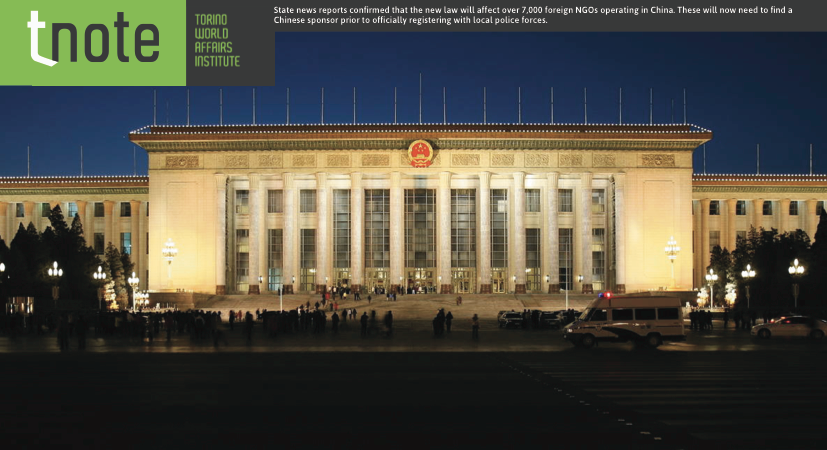
The international critique to the recently passed Law on the Management of Foreign Non-Governmental Organizations’ Activities Within Mainland China (Foreign NGO Law), has focussed mainly on the hurdles that the Law will pose to international development cooperation. The choice to regulate the activities of foreign and foreign-funded civil society organizations through an ad hoc law has been seen as part of a global backlash against Western civil society. While the Law does pose strict requirements in terms of registration, transparency, and accountability of foreign NGOs, it also signals a much more important trend.
The enactment of the Foreign NGO Law signals how China may be getting closer to playing a more relevant role in the shaping of global norms on civil society. The element that in a not so distant future may allow China to play such a role is not determined by the limitations introduced by the Foreign NGO Law, but by mechanisms of an entirely different order.
The Foreign NGOs Law shares the same concept of NGOs as this concept is emerging in international fora. According to the existing consensus at the UN, NGOs are formally constituted organizations, and hence they can exist only under a state regulatory framework, while civil society organizations constitute a much broader category that includes groups that may be established and exist informally, outside of a state’s legal framework. This fact is important, as it signals China’s will to conform to emerging global standards on civil society. Such conformity is only the first step to contributing to the shaping, or reshaping, of these standards.
It is well known that NGOs do not represent any specific sector of the population – they are non-partisan; they operate at a distance from the mechanisms of political representation; they provide services to governments and society; they mobilize public opinion on issues of domestic and global relevance. Accordingly, the Foreign NGO law has not required that NGOs follow the political representation mechanisms that exist in China – the mass line. Foundations and other charitable entities, whether foreign or Chinese, are required to put into practice the Twelve Socialist Core values, and spread the traditional values of China’s ethnic peoples. On the contrary, NGOs benefit from a substantial autonomy in the values they embody and promote through their programs. These values need not be the same as those promoted by the state. As long as it is not seen to pose a political or security threat to the prevailing value system, a certain pluralism in values is becoming a reality. As abstract as values may seem, this is an important feature of the Foreign NGO Law, which may allow international civil society to become better embedded in China.
At the global level, a multilevel, multi-stakeholder approach to the governance of NGOs has been adopted. In light of this, China’s choice to divide governance responsibilities among a variety of actors, which include, but are not limited to, public security organs, appears to be in line with existing practices. Civil society involves complex networks of stakeholders, which respond to often contingent and unforeseeable needs, and relate to various state and non-state actors. Given the complexity of the environments, institutional and otherwise, where NGOs operate, centralizing governance tasks within a single organization could have hampered the efficiency of NGOs, and limited their capacity to deliver.
While part of the rationale behind the Foreign NGO Management Law lies in the will to avoid perceived foreign ‘interference’ in China’s domestic politics, a much more important factor is at play. By design, the Foreign NGO Management Law supports China’s ‘go out’ policies as the “One Belt, One Road Initiative.” As Chinese authorities have admitted, despite China’s long tradition of philanthropy, the NGO sector is still relatively young. Therefore, many of the principles and practices, that are commonplace among foreign NGOs are being introduced in China at the time of writing this article. These are the well-known principles of transparency, accountability, integrity, efficiency, fairness, participation, and ownership. Interaction between foreign and Chinese NGOs will undoubtedly allow the latter to slowly absorb each one of these seven principles, and to engage foreign NGOs and actors. This engagement will allow China’s civil society to adopt the best practices of their foreign counterpart. Adopting best practices will pave the way for China’s NGOs to play a more effective and efficient role in the “One Belt, One Road Initiative,” strengthen cooperation with China’s OBOR partners, and indirectly support China’s push to achieve a much more significant role in global affairs.
Until a very recent past, non-governmental, no-profit organizations established by foreigners inside or outside of China enjoyed no legal personality. In a sense, they existed and operated outside of the law. The choice to relegate all those organizations to a legal limbo, where they could be suppressed at will, testified to a reluctance to engage foreign partners on an equal footing. The decision to bestow legal personality on Foreign NGOs, despite the limitations that have been set on their work, testifies to the will to broaden and deepen the engagement of foreign NGOs.
Engagement, whether it be engagement of foreign companies in the late 1970s or of foreign NGOs in 2016, is a double-edged sword, which poses unpredictable challenges, as well as offers novel opportunities. Thus far, despite the international criticism it has attracted, the drafters of the Foreign NGO Law have identified those opportunities which may allow China not just to play a generically more significant role in global affairs, but also to shape emerging global norms on civil society.
The Foreign NGO Law, alone, is not sufficient to suddenly turn China from a receiver of international norms into a maker of such norms. Other steps and factors will be needed, and their action will have to be spread over the medium term, and in synergy. Thus far, however, China seems to have embarked upon a course most beneficial for the country.
Download


Copyright © 2024. Torino World Affairs Institute All rights reserved
